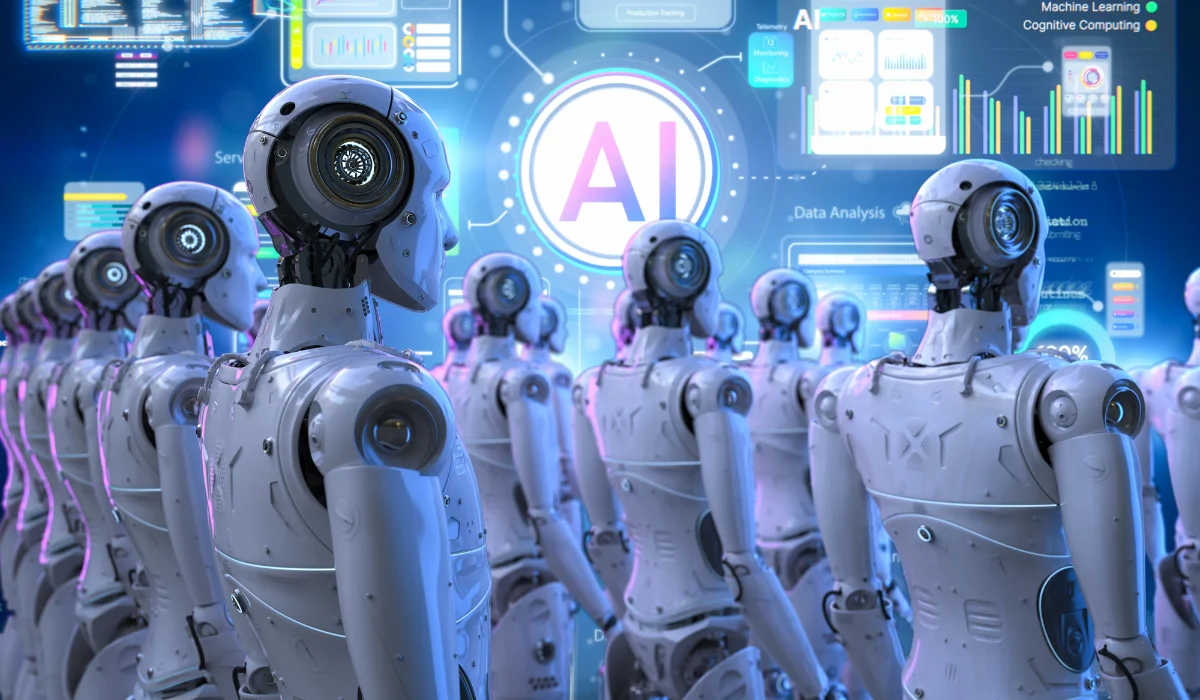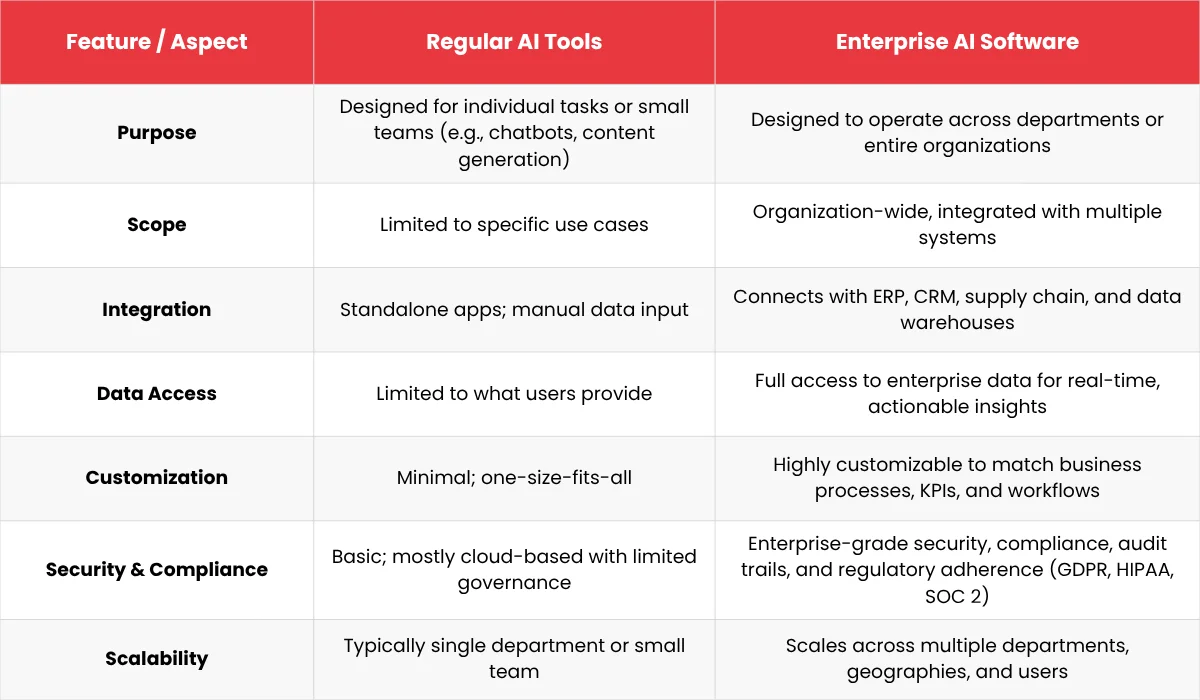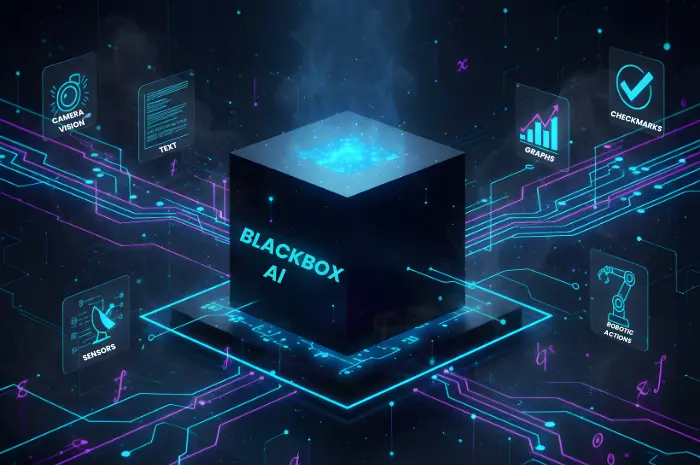Five years ago, AI felt like something only tech giants could afford to experiment with. Today, it’s a boardroom priority. Companies across industries, manufacturing, finance, healthcare, logistics, and retail, are rethinking how they operate, driven by one question:
How can AI help us work smarter, grow faster, and stay ahead of competition?
For many business leaders, the answer lies in enterprise AI software. You’ve likely heard the term, maybe even seen competitors adopt AI-driven tools,but what exactly does it mean, and why does it matter for your business strategy?
This isn’t about downloading a chatbot or experimenting with a single AI app. It’s about integrating intelligence deep into the core of your business,so your teams, processes, and systems can move faster and make better decisions, consistently.
In this blog, we’ll break down what enterprise AI software is, how it’s different from everyday AI tools, and why companies are making it a strategic investment. You’ll get a clear picture of its business impact, the ecosystem behind it, and the practical steps to get started.
What Is Enterprise AI Software?

Enterprise AI software refers to AI-powered platforms and applications built to work within a company’s existing business ecosystem,securely, at scale, and across multiple functions. It’s not a standalone app or a one-off chatbot. It’s the intelligence layer that connects with your ERP, CRM, data warehouses, and business workflows to drive automation, insights, and decision-making across the enterprise.
Key Characteristics of Enterprise AI Solutions
To be considered “enterprise-grade,” AI software typically has:
- Scalability: Handles large volumes of data, multiple users, and complex workflows without compromising performance.
- Integration readiness: Works seamlessly with core systems (ERP, CRM, supply chain, HRMS) rather than existing in silos.
- Security and compliance: Meets data privacy, governance, and industry regulations,critical for regulated sectors like finance or healthcare.
- Customizability: Can adapt to unique business processes, rather than forcing you to fit into its structure.
- Lifecycle management: Includes monitoring, retraining, version control, and model governance to keep AI outputs accurate and relevant over time.
Also Read: Which AI Technologies Are Worth Investing in Now
Types of Enterprise AI Software (and Their Business Impact)

1. AI Platforms
What they are: Comprehensive environments that allow enterprises to build, train, deploy, and manage AI models end to end. These platforms include data preparation tools, machine learning pipelines, deployment infrastructure, and monitoring dashboards.
Where they fit:
- When companies have unique problems or proprietary data that generic solutions can’t solve.
- For building predictive models, generative AI solutions, or complex analytics pipelines tailored to the business.
Business impact:
- Full control over how AI models behave and evolve.
- Ability to address specific business problems (e.g., predicting equipment failures, forecasting demand, detecting anomalies in financial transactions).
- Stronger data governance and IP ownership, since models are developed on internal data.
2. AI-Powered Applications
What they are: Pre-built solutions designed for specific business functions or use cases. They use AI under the hood but come with ready-to-use interfaces, workflows, and features. Examples include fraud detection tools, intelligent customer service chatbots, demand forecasting systems, or recommendation engines.
Where they fit:
- When a business wants quick wins in well-defined areas without starting from scratch.
- Suitable for functions like marketing, finance, supply chain, HR, and customer support.
Business impact:
- Faster deployment with less upfront development.
- Immediate productivity gains,like automating invoice processing, personalizing marketing campaigns, or triaging support tickets.
- Reduces dependency on technical teams for basic AI functions, letting business users act on insights directly.
3. Embedded AI Features in Existing Systems
What they are: AI capabilities built into core enterprise software such as ERP, CRM, or SCM platforms. Instead of purchasing or developing a separate AI tool, companies leverage enhancements within their existing systems.
Where they fit:
- Ideal for businesses that want to gradually introduce AI without overhauling infrastructure.
- Useful when existing platforms already collect large volumes of operational data.
Business impact:
- Extends the value of existing technology investments.
- Improves decision-making within day-to-day workflows,for example, an ERP that automatically optimizes inventory reorder levels, or a CRM that suggests next-best actions for sales reps.
- Minimal change management since users continue working in familiar tools.
This breakdown gives your readers a clear way to map their current stage and decide what type of AI investment fits their strategy,whether they need a fully custom platform, a functional plug-and-play app, or embedded intelligence inside their current stack.
Also Read:A Full Guide on Enterprise AI Chatbots for Business Leaders
What Is the Difference Between AI and Enterprise AI Software

It’s easy to blur the line between “AI tools” and “enterprise AI software.” After all, both use artificial intelligence to automate tasks or generate insights. But the difference lies in depth, scale, and control. For a business deciding where to invest, this distinction matters.
1. Purpose and Scope
- Regular AI tools are typically built for individual users or small teams to handle specific tasks,think of a chatbot for answering FAQs, or a generative AI tool for writing marketing copy.
- Enterprise AI software is designed to reshape how entire functions,or even the whole organization,operates. It connects to internal systems, pulls from your company’s data, and drives strategic decisions across departments.
Why this matters: Regular tools can create isolated productivity boosts, but enterprise AI solutions deliver organization-wide transformation.
2. Integration and Data Access
- Regular AI tools usually work as standalone apps. You upload data manually or work within the tool’s limited ecosystem.
- AI-powered enterprise AI integrates directly with ERP, CRM, supply chain platforms, and data warehouses. It doesn’t just consume data,it becomes part of your data flow.
Why this matters: Integrated AI systems produce more accurate insights, automate end-to-end workflows, and avoid the “data silos” that slow businesses down.
3. Security, Governance, and Compliance
- Regular AI tools are often cloud-based and shared across users. Data governance options are limited.
- Ai-powered enterprise solution is built with security and compliance at its core,supporting data encryption, access controls, audit trails, and adherence to industry regulations (like GDPR, HIPAA, or SOC 2).
Why this matters: When you’re dealing with sensitive financial records, patient data, or proprietary business logic, governance isn’t optional,it’s essential.
4. Customization and Control
- Regular AI tools are one-size-fits-all. You use the features provided, with little room to adapt them to your exact processes.
- Enterprise AI solutions are designed to be customized. You can tailor models, workflows, and outputs to match your business goals, KPIs, and operational nuances.
Why this matters: Competitive advantage comes from using AI in ways your competitors can’t simply copy. Customization turns AI into a strategic asset, not just a utility.
5. Scalability and Lifecycle Management
- Regular AI tools typically don’t scale well across multiple departments or geographies. Updates and monitoring are manual.
- Enterprise AI software includes pipelines for continuous data ingestion, model retraining, versioning, and monitoring. It’s built to support growth, evolving datasets, and more users over time.
Why this matters: Businesses don’t just need AI that works today,they need AI that stays accurate and valuable as they scale.
6. ROI and Strategic Value
- Regular AI tools offer quick wins and incremental productivity gains.
- Enterprise AI solutions align with broader business objectives,whether that’s reducing operational costs by 30%, improving forecast accuracy, or enabling new revenue streams.
Why this matters: One solves tactical problems. The other shapes the company’s strategic trajectory.
In short, regular business AI tools are like helpful assistants; enterprise AI is like adding a new strategic brain to your organization. The first boosts individual productivity. The second transforms how the entire business operates.
Why Businesses Should Develop Enterprise AI Software
Adopting enterprise AI software isn’t just about keeping up with technology trends. It’s about building a smarter, faster, and more resilient business. Below are the key reasons businesses are making enterprise AI a core part of their strategy.
1. Automating Manual, High-Volume Tasks
Every company has processes that are essential but time-consuming,invoice approvals, document classification, customer service triage, inventory checks, compliance reporting. These tasks often involve repetitive work that eats into valuable employee hours.
Enterprise AI software can automate these at scale, not through simple scripts, but through intelligent decision-making that adapts to context. For example:
- Auto-processing thousands of invoices daily with near-zero error rates.
- Automatically routing customer queries to the right team based on intent.
- Scanning legal or financial documents for anomalies or missing information.
Business impact: Lower operational costs, fewer human errors, faster turnaround times, and employees freed up to focus on higher-value work.
2. Making Data-Driven Decisions at Scale
Traditional BI tools show you what happened. AI-powered enterprise platforms tell you what’s likely to happen next,and sometimes, what to do about it. Predictive and prescriptive analytics use historical data, patterns, and machine learning models to support faster and more confident decision-making.
Use cases of enterprise AI software include:
- Forecasting demand to optimize production and inventory.
- Predicting customer churn to intervene early.
- Identifying risk patterns in financial transactions before issues arise.
Business impact: Decisions shift from intuition-based to evidence-based, improving accuracy and speed across functions.
3. Gaining Competitive Advantage
When every company has access to similar markets, products, or talent, execution becomes the differentiator. Enterprise AI enables organizations to operate with greater precision and speed than competitors who rely on manual or fragmented systems.
This advantage compounds: faster product innovation, quicker response to market shifts, and the ability to personalize experiences at scale. Companies that operationalize AI early often find that competitors struggle to catch up,not because the tech is unavailable, but because the intelligence is deeply embedded in their operations.
4. Enhancing Customer Experience
Modern customers expect immediate, personalized, and frictionless experiences. Enterprise AI makes that possible across touchpoints:
- AI chatbots that understand complex queries and escalate intelligently.
- Recommendation systems that tailor products and content to individual preferences.
- Real-time service personalization based on behavior and history.
Business impact: Stronger customer loyalty, higher retention, better conversion rates, and improved lifetime value.
5. Improving Agility and Innovation
Markets shift quickly. Enterprises that rely on manual analysis and legacy systems often react too slowly. AI accelerates feedback loops by surfacing insights in real time and enabling rapid testing of new ideas,whether that’s launching a new product, adjusting supply chain flows, or personalizing a marketing campaign.
Business impact: Faster time-to-market, more informed pivots, and a culture of experimentation backed by data rather than guesswork.
6. Driving Strategic ROI and Long-Term Value
The ROI of enterprise AI solutions extend beyond short-term cost savings. Companies see value in areas like:
- Revenue growth: Through better targeting, personalization, and product optimization.
- Risk reduction: Early anomaly detection and stronger compliance.
- Operational resilience: Systems that adapt dynamically as data changes.
- New business models: AI insights often uncover untapped opportunities that legacy processes can’t see.
Business impact: AI becomes a strategic lever, not just a cost-cutting tool,one that compounds in value as models improve and data grows.
Key Components of a Strong Enterprise AI Software Ecosystem
Implementing enterprise AI isn’t just about buying a software license. It’s about building an integrated ecosystem where AI can operate effectively, reliably, and securely. Understanding these components helps business leaders evaluate solutions and plan their adoption strategy.

1. Data Infrastructure
What it is: The foundation that collects, stores, and organizes data from multiple sources,internal systems, third-party platforms, IoT devices, or customer interactions.
Why it matters: AI’s effectiveness depends entirely on the quality and accessibility of data. A robust infrastructure ensures that models have clean, comprehensive, and consistent data to learn from.
2. AI/ML Platforms
What it is: Platforms that enable model development, training, deployment, and monitoring. Includes tools for machine learning, deep learning, natural language processing, and generative AI.
Why it matters: Centralized platforms allow your team,or a development partner,to build models that are tailored to your business needs, rather than relying solely on off-the-shelf solutions.
3. Integration Layer
What it is: The connectors, APIs, and middleware that allow AI to work with existing enterprise systems,ERP, CRM, SCM, HRMS, and more.
Why it matters: Without integration, AI insights remain isolated and underutilized. The integration layer ensures that AI outputs flow seamlessly into workflows and dashboards used by decision-makers.
4. Monitoring & Governance
What it is: Tools and processes to track AI model performance, detect biases, ensure compliance, and manage security. Includes audit trails and alert systems.
Why it matters: AI is not static. Without governance, models can degrade, generate biased outcomes, or violate regulations.
5. User Interfaces & Adoption Tools
What it is: Dashboards, apps, and workflow tools that translate AI insights into actionable decisions for employees and managers.
Why it matters: Even the most advanced AI is useless if teams can’t understand or act on its outputs. Intuitive interfaces accelerate adoption and improve decision-making speed.
6. Support & Lifecycle Management
What it is: Ongoing maintenance, retraining of models, software updates, and technical support.
Why it matters: Enterprise AI is a long-term investment. Without continuous support, models become obsolete, accuracy declines, and ROI diminishes.
This ecosystem view clarifies that enterprise AI is more than software,it’s a coordinated infrastructure. Each layer supports the others, ensuring AI delivers value consistently, securely, and at scale.
Don’t Build Enterprise AI Software Alone
Building and scaling enterprise AI isn’t simple. It requires expertise, infrastructure, and governance,things most companies don’t have internally. Partnering with experienced AI development services solves this challenge and accelerates real business value.
Key benefits include:
- Faster time-to-value: Experienced teams bring frameworks and methodologies that shorten deployment timelines.
- Specialized expertise: Access to AI, data engineering, cloud, and integration skills without hiring a full in-house team.
- Scalable, future-ready systems: Ensure AI solutions grow with your business and evolving needs.
- Risk reduction: Avoid common pitfalls like poor data quality, model drift, and integration failures.
- Strategic focus: Align AI initiatives with measurable business outcomes rather than just technical implementation.
- Continuous support: Ongoing monitoring, retraining, and updates keep AI systems accurate and relevant over time.
Partnering doesn’t just make implementation easier,it turns AI into a strategic asset, not a side project.
Conclusion
Not every company needs every AI tool, but the ones that use it strategically see the difference across operations, customer experience, and growth. Enterprise AI isn’t about flashy features or trying to adopt the latest trend. It’s about embedding intelligence into the systems and workflows your business already relies on,so decisions are faster, insights are actionable, and processes run more efficiently.
Partnering with experienced enterprise AI development teams makes that possible. They bring the expertise, infrastructure, and governance needed to turn your data into a reliable, scalable, and continuously improving asset. With the right approach, AI becomes more than automation, it becomes a lens for spotting opportunities, mitigating risks, and unlocking new ways to compete.
For business owners, the takeaway is clear: enterprise AI is no longer optional. The businesses that invest wisely today aligning technology with strategy leveraging expert guidance, and focusing on measurable outcomes, are the ones that will shape the markets of tomorrow.
FAQs: Enterprise AI Software (Audience-Focused)
What’s the difference between AI and enterprise AI?
Regular AI tools handle specific tasks for individuals or teams. Enterprise AI software works across the organization, integrates with core systems, and delivers strategic insights at scale.
Do I need an in-house team to manage enterprise AI software?
Not necessarily. Many companies partner with AI development services to build, deploy, and manage enterprise AI solutions, reducing the need for a large internal team.
Is enterprise AI software suitable for small or mid-sized businesses?
Yes. Modern enterprise AI solutions are scalable and can be tailored to fit smaller organizations, helping them compete more effectively and improve operational efficiency.
What is the cost of developing enterprise AI solutions?
Costs depend on scope, data complexity, and customization. Engaging with an AI development service can help define a solution that balances investment with ROI.






